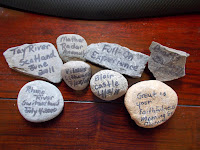Post from July 17 "Situational Awareness"
I drove to Long Cane Middle School today to work on the lab sinks for a couple of 6th grade science teachers. As I was driving flashbacks to my time in Zambia kept coming to mind. The village we visited had brick or cement block huts with thatched roofs. Most of the people had two changes of clothes: one for every day and one for special occasions. Furniture consisted of hand-carved stools, and a chair or two for guests. Food was simple and nutritious, and readily shared with whoever needed it. Above all, the Zambian people were grateful for what they had. They were happy to have clothes on their back , food in their stomachs and a roof over their heads. And they were proud and satisfied with what they had.
I had a conversation about this with a young Zambian man in Livinstone on this very topic. He told me that in his village you learned to be thankful for and share whatever you had. It is considered rude to complain or wish for more. He and I agreed that Americans are never satisfied. We always want bigger, better and more. We want the newest, latest, whatever is popular.
What does this have to do with situational awareness? We lack it. Where is our spirit of gratitude? We think of things we have as "ours" when they are simply on loan to us from our God. We forget from where our blessings come, and we are rarely thankful. A good wage in Zambia is about 15 Kwacha a day (that is about $3). You say food is cheap. No it isn't. And the person earning that $3 a day has to share it with his/her extended family. Regardless, they are thankful for the opportunity to work and earn some money. Youth minister Brian Nobles said it best, "Stop thinking of gratitude as a by product of your circumstances and start thinking of it as a world view."
I climbed the tank at NDO each evening to what the sunset. Each time I was moved to say thanks to the One who designed it. It was difficult not to be aware of the situation on that tower. It was quiet, most of the time I was alone with God, and the view was always spectacular. All of this compelled me to give thanks to God for creating another beautiful sunset and letting me survive another day to witness it. Let me challenge you to exercise some "situational awareness." Thank those around you who serve you, and thank God that you have air breathe, food to eat and you are alive one more day to be a living sacrifice (Romans 12:1-2).
Please don't think I am trying to be preachy. Just sharing what God revealed to me today in light of my experience in Zambia. Darbi, I am indeed in love with Zambia and its people. I am thankful for the opportunity to have served there, and pray God grants me the opportunity to return. Twalumba Mwami leza (We thank you Lord God!).


Comments
Post a Comment